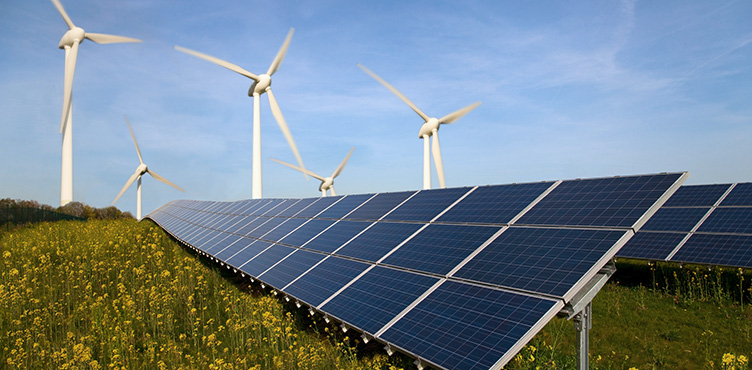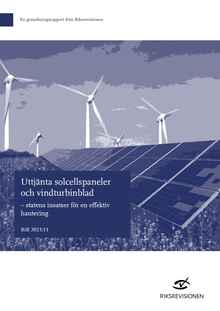Sweden is not ready to handle old solar panels and wind turbine blades
Sweden is not ready to manage large anticipated future quantities of used solar panels and wind turbine blades. The Government, the Swedish Environmental Protection Agency, and the Swedish Energy Agency need to take measures to ensure that these products can be reused or recycled as far as possible.

Photo Cultura Creative
The number of solar energy and wind power facilities is growing rapidly, and within a few decades the quantities of end-of-life solar panels and wind turbine blades is expected to multiply.
The Swedish National Audit Office’s audit shows that the Government and the agencies responsible (the Swedish Environmental Protection Agency and the Swedish Energy Agency) have not ensured that end-of-life solar panels and wind turbine blades can be managed according to the waste hierarchy, that is, by promoting reuse or recycling in the first place*.
“Central government policy instruments are inadequate for ensuring that the growing quantities of end-of-life solar panels and wind turbine blades will be handled effectively,” says Auditor General Helena Lindberg.
As regards the solar panels, the major problem is that producer responsibility for electrical equipment does not ensure that end-of-life solar panels will be collected for treatment. Producer responsibility means that whoever supplies a product in Sweden is responsible for its electrical waste and related costs.
However, currently there may be large quantities of solar panels for whom no one assumes producer responsibility. The Swedish National Audit Office’s assessment is that this is partly due to the fact that rules on producer responsibility are not clear and due to shortcomings in the Swedish Environmental Protection Agency’s supervision. Taken together, this increases the risk that solar panels will not be collected for treatment.
“Given that the quantity of end-of-life panels is expected to increase from just over the current 10 tonnes to more than 20,000 tonnes per year after 2050, the Government and the Swedish Environmental Protection Agency need to ensure that producer responsibility functions properly,” says Fredrik Engström, Project Leader for the audit.
As regards wind turbine blades, the volume of end-of-life blades is expected to amount to around 15,000 tonnes in the five-year period around 2030, and around 40,000 tonnes in the five-year period around 2035. The audit shows that it is not currently known how blades that are decommissioned are treated. It is also not clear whether the Swedish bans on incineration and landfilling always apply to end-of-life wind turbine blades. However, the Swedish National Audit Office notes that incineration and landfilling appear to be the main treatment methods.
Recommendations in brief
The recommendation to the Government is to review what legislative amendments can be made to clarify which types of solar panels are covered by producer responsibility for electrical equipment.
Recommendations to the Swedish Environmental Protection Agency include establishing criteria for assessing whether producer responsibility applies to solar panels and following up how decommissioned wind turbine blades are treated in Sweden.
Recommendations to the Swedish Energy Agency include developing energy statistics so they can be used as a basis for estimates of future quantities of end-of-life solar panels.
See the report for the recommendations in full.
* The objectives of the European waste hierarchy are firstly to prevent waste, secondly to reuse waste, thirdly to recycle, and fourthly to recycle in some other way – for example by recovering the energy content in the form of district heating or electricity in incineration facilities. Waste disposal through landfills or similar should be used as a last resort.
Press contact: Olle Castelius, phone: +46 8-5171 40 04.
Presskontakt: Olle Castelius , telefon: 08-5171 42 06.
Share in social media and by e-mail
Contact form
Send your questions or comments via the form below and we will make sure that they reach the right member of staff. Please state if your question concerns the information on this particular page.


